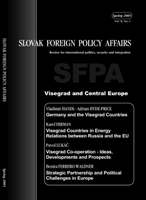Czechoslovakia/the Czech Republic and the Visegrad Co-operation -Foreign and Security Policy since 1989
Czechoslovakia/the Czech Republic and the Visegrad Co-operation -Foreign and Security Policy since 1989
Author(s): Josefine WallatSubject(s): Politics / Political Sciences
Published by: Research Center of the Slovak Foreign Policy Association (RC SFPA)
Summary/Abstract: Using the example of the Visegrad co-operation this article shows that the role of leading individuals and their ideas on the formation of Czechoslovak/Czech foreign and security policy cannot be underestimated. While it is rather unusual for the policy of established democracies to be influenced so strongly by a small number of leading individuals, the situation in Czechoslovakia and the Czech Republic was exceptional. The democratic revolution in 1989 and the break-up of Czechoslovakia had discredited the old bureaucracy, a political party system was only slowly being born and parliament began playing a stronger role only in the late 1990s. In this phase of political, economic and societal transformation, foreign and security policy was only rarely in the centre of public and political interest. In these unusual domestic circumstances charismatic individuals enjoyed exceptional freedom in following their ideas on foreign policy.
Journal: Slovak Foreign Policy Affairs
- Issue Year: II/2001
- Issue No: 01
- Page Range: 24-35
- Page Count: 12
- Language: English
- Content File-PDF

